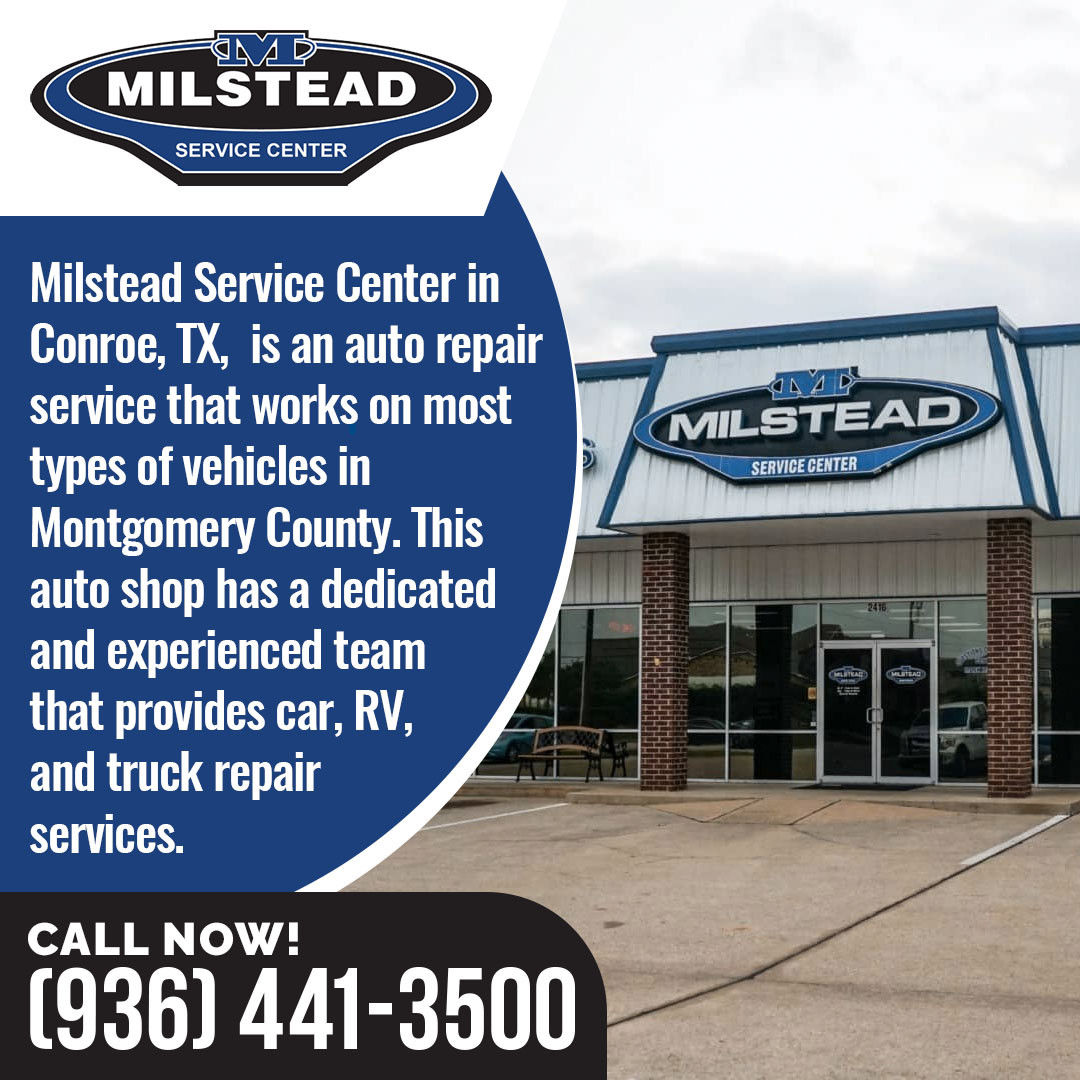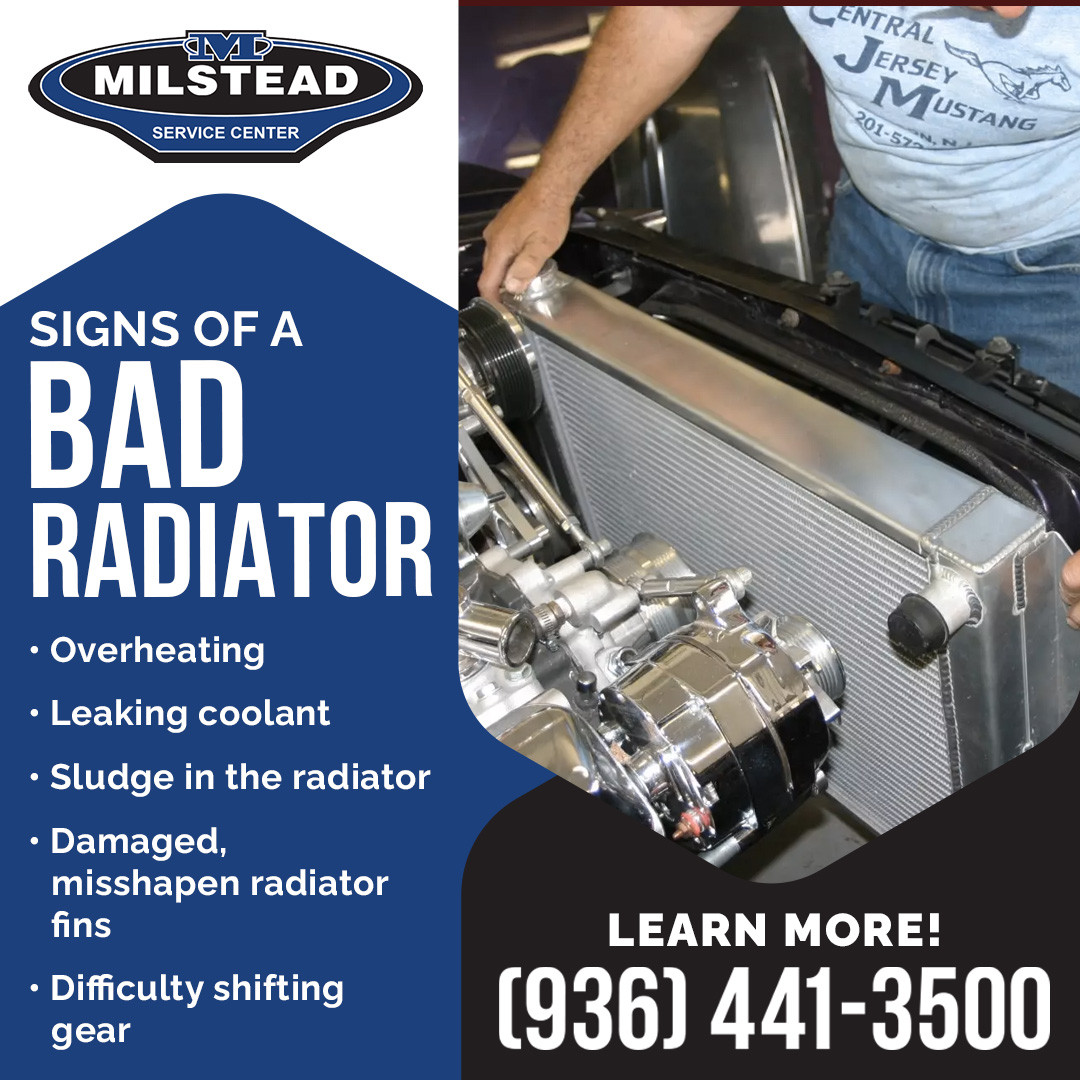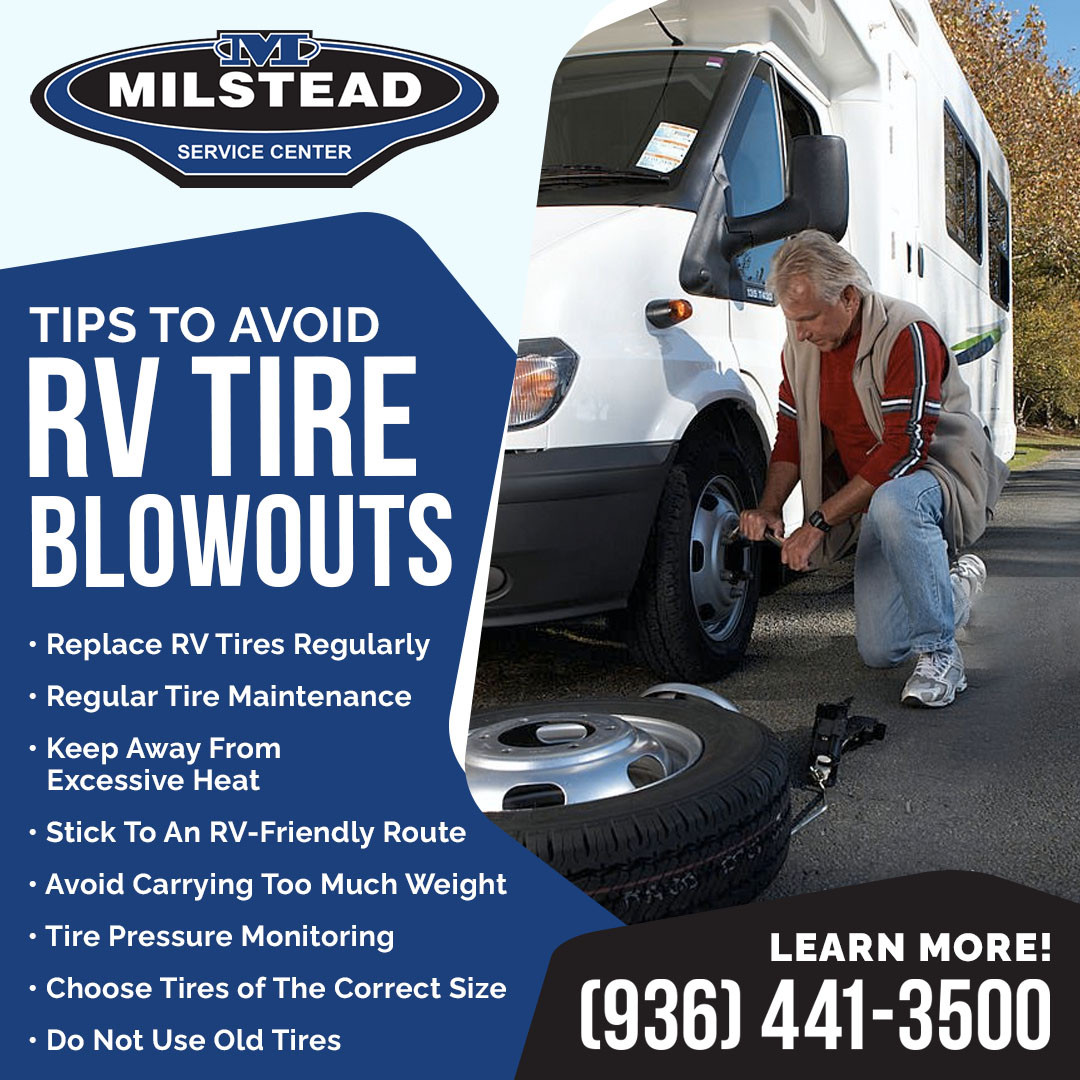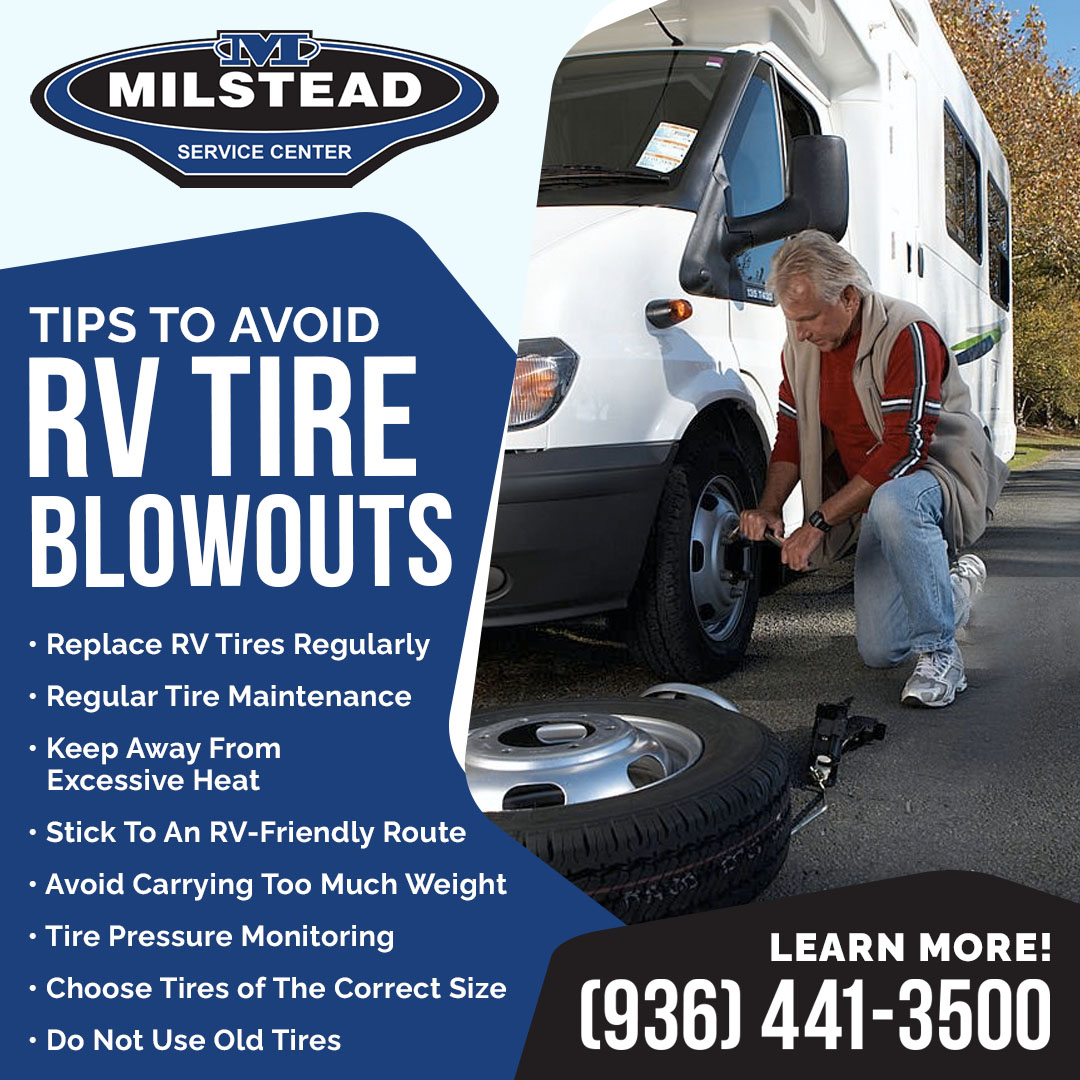Wednesday, December 7, 2022
Monday, December 5, 2022
Truck Failures On The Road

Common Truck Failures Or Problems
Conroe, United States - November 21, 2022 /Milstead Service Center/
Trucks travel long distances and transport different goods and objects across the country. It is expected that truck drivers will encounter minor problems and significant truck failures, which may result in travel delays. These issues can lead to costs for towing and truck repair, add to downtime, which leads to a loss in revenue, and create stress in truck drivers if they cause frequent changes in their schedules.
.jpg)
Understanding the reasons for truck failure is advantageous for truck drivers, which results in timely truck repair and maintenance and reduces the risk of truck accidents. In this article, Milstead Service Center in Conroe, TX, shares some common truck failures faced by drivers. Milstead Service Center is a family-owned premier auto/truck/RV service center in Conroe, TX, providing affordable and dependable auto, RV, and truck repair in Conroe, TX, since 1972.
Common truck failures
1. Faulty Brakes
Malfunctioning brakes are estimated to cause about 5% of all truck failure problems faced by drivers. One of the most common repairs is brake repair. Since the cargo is heavy, truck braking systems strain more. The higher strain on the braking systems makes them more prone to develop fluid or air leaks. Corrosion and exposure to dirt or moisture can lead to brake failure if maintenance and repair are not done adequately.
2. Tire Problems
Tires damage and blowouts occur during trips. Since trucks are hefty, their tires need precise air to keep the vehicle under control and distribute the weight evenly. Even if one tire is worn down or has too little or too much pressure, it can compromise the truck’s safety. Trucks must be inspected for their tires for tread wear, pressure, air leaks, and sidewall damage.
3. Engine breakdown
Though truck engines are quite efficient, they are not immune to the possibility of breakdowns. A coolant leak or blown gasket may lead to overheating of the truck engine. Oil oxidation causes engine problems. Faulty fuel injectors and pumps are frequently seen as the cause of engine failure. The longer the truck runs, the more important it is to ensure regular engine repair and maintenance.
4. Starter Problems
During the cold season, starter problems are more prevalent, but they can happen anytime during the year. A loose connection or corroded battery may cause starter difficulty, which can be rectified by replacing the affected component. Sometimes the starting parts themselves develop problems. Worn brushes, damaged armatures, coil windings that draw excess current, and increased internal friction from magnets that rub against each other are all problems with the starting parts. In such situations, the starter may crank the engine too slow, too loud, or not at all.
5. Maneuvering difficulty
Since trucks are enormous and usually carry heavy cargo, they are more challenging to maneuver. Trucks need more room than ordinary vehicles to make movements like turning or spinning. They would not be able to make sudden changes in direction or swerve swiftly when coming across a sudden obstacle. Sudden halts of a truck towing a trailer can cause the vehicle to jackknife, posing a danger to the truck driver and others in the vicinity of such an incident.

Truck repair and maintenance are essential. A reliable truck repair center will help maintain truck engines in good condition and safe on the road. Milstead Service Center in Conroe, TX, is an auto repair service that works on most types of vehicles in Montgomery County. This auto shop has a dedicated and experienced team that provides car, RV, and truck repair services. For truck repair in Conroe, TX, Milstead Service Center can be contacted by dialing (936) 441-3500.
Symptoms of A Bad Or Clogged Radiator

Signs That A Radiator Is In Bad Condition
Conroe, United States - November 14, 2022 /Milstead Service Center/
A car engine gets hot when it runs. Overheating can be dangerous. Temperature regulation is essential to prevent any damage due to overheating. The water pump, hoses, thermostat, and radiator are all parts of a cooling system in cars that regulates temperature. The radiator keeps a vehicle cool by heat exchange. When the thermostat detects excess heat from the engine, the radiator releases coolant and water to run through and absorb the heat from the engine. The heat transfers to the liquid and is sent back to the radiator. The radiator then blows air across the liquid and exchanges the heat with air outside the vehicle. A fan that blows air across the radiator and thin metal fins allow heat to escape to the air on the exterior.

A radiator plays a vital role in the safe functioning of a car. So, when a radiator is not functioning correctly, it must be looked into and may need auto repair. In this article, Milstead Service Center, Conroe, TX, lists the signs that indicate that a radiator is in bad condition. Milstead Service Center is an auto repair shop with expert ASE-certified mechanics with expertise in automotive technology, diagnostics, and repairs. For auto repair in Conroe, TX, by an experienced, affordable, and dependable expert, Milstead Service Center is the apt choice.
Signs of a bad radiator
1. Overheating
Overheating a vehicle engine under normal conditions signifies a failing radiator. Though the radiator cools the engine, overheating can also be due to other problems, like a faulty thermostat.
2. Leaking coolant
A pool of yellow, green, or red liquid under a parked vehicle is due to a coolant leak. A coolant leak can be due to a problem with the radiator, hose, or engine block. A mechanic like Milstead Service Center can locate the source of the leak and provide radiator repair in Conroe, TX.
3. Sludge in the radiator
The coolant usually flows from the radiator to the coolant passages in the car engine. A bad radiator can lead to debris and sludge accumulation, contaminating the coolant. When the coolant in the radiator appears rusty in color, instead of the usual bright green, yellow, or red, it may indicate contaminant buildup in the radiator. Contaminants affect the performance of the radiator negatively. A mechanic can check the radiator to find out what is causing the discoloration of the coolant.
4. Damaged, misshapen radiator fins
The fins of the radiator get damaged easily. A few damaged fins may not lead to significant engine overheating. But, when more fins are damaged, less coolant flows in the radiator, leading to overheating. The chances of a leak are higher if the radiator has smashed fins.
5. Difficulty shifting gear
In cars with an integrated transmission cooler, a faulty radiator can cause issues in shifting gears which occurs when the fluid is contaminated by the coolant due to cracks or other problems in the system.

Ignoring the symptoms of a bad radiator can lead to more time and money being wasted later. If these symptoms are not noticed, the problems with the radiator can lead to engine damage or breakdown. It is better to check the radiator when such signs occur and get service from an auto repair shop. Car repair in Conroe, TX, can be done at Milstead Service Center. The dedicated and experienced team at Milstead Service Center works on most vehicles, including RVs, trucks, SUVs, vans, and cars. This expert mechanic is committed to delivering quality and value, and they work to earn the trust and satisfaction of customers. Car owners in need of car repair in Conroe, TX, can contact Milstead Service Center by calling the phone number(936) 441-3500.
How To Prevent RV Tire Blowouts?

Milstead Service Center Shares Tips To Avoid RV Tire Blowouts
Conroe, United States - November 8, 2022 /Milstead Service Center/
Regular RV maintenance and repair are required whether you live or travel in an RV. Taking care of the vehicle is essential for safety to make each travel meaningful and memorable. Tires need the care to avoid RV tire blowouts, which can lead to accidents, upset time schedules, and disrupt travel plans. When they blow out, RV tires can destroy electric lines, damage propane tanks, and spoil the rig's underside.

Milstead Service Center, in Conroe, TX, is an auto repair shop that provides RV repair. This service center provides honest and courteous service in Conroe and neighboring areas. Milstead Service Center performs all minor and significant mechanical, electrical, and body repairs.
Tips to avoid RV tire blowouts
1. Replace RV Tires Regularly
To reduce the risk of RV tire blowout, RV owners should replace the tires regularly to keep the vehicle and occupants safer. Replacing tires every 3 to 6 years is advisable, depending on the use of the RV.
RVs in full-time use might need RV tire replacement before six years. It is good to check tires before every trip, with attention to tread depth, cracking, sun damage, sidewall damage, and uneven wear. RV owners must also check tire pressure and tighten the lug nuts before each trip.
2. Regular Tire Maintenance
Regular tire maintenance is essential to prevent tire blowouts. A physical check before heading out on the RV is integral to tire maintenance. Tire pressure, wear of the tires, and tread depth are all part of the check. Check the wheel alignment and balance and ensure tire rotation during regular RV service.
Parking RVs on grass or dirt for a long time exposes the tires to moisture that can rot the tires. If parking on dirt is the only option, raise the RV off the ground with jack pads to keep them away from moisture and reduce the risk of flat spots developing. Parking on asphalt is better unless it is in a hot climate. If the RV is parked long-term, it is good to drive it a bit at least once a month, which helps to prevent flat spots that develop when pressure is exerted on the same spot on tires for long periods.
3. Keep Away From Excessive Heat
Applying brakes frequently, driving at high speed, and excessive cornering can cause extreme heat on tires. Heat makes the rubber of tires weak and leads to the expansion of the tires. It is better to avoid speeding in an RV so that the tires are not heated up, and the journey is more enjoyable. Taking breaks during long rides in hot climates will also reduce the risk of the tires heating up.
4. Stick To An RV-Friendly Route
RV tires can blow out because of debris or nails and screws on the roads that damage them. It is prudent to avoid taking routes through construction areas and where there is loose debris that may damage RV tires. If this is not practical, the RV owner or driver can inspect the tires whenever they stop for a fuel refill or break.
5. Avoid Carrying Too Much Weight
More weight can exert more pressure on the tires, causing tire blowouts. Such blowouts can make the vehicle flip over or lead to difficulty with braking. The more weight the RV carries, the longer it will take to stop it. The driver or RV owner must know how much the trailer weighs and the maximum weight rating of the vehicle. Insurance claims may be denied citing the extra weight if the RV weighs more than the recommended weight and meets with an accident.
6. Tire Pressure Monitoring
Using a tire pressure monitor can help avoid RV tire blowouts. Low or high tire pressure is dangerous. The pressure of the RV tire must be the maximum cold inflation pressure listed on the tire's sidewall. Some monitors provide alerts with readings. Checking these alerts will help to take the RV off the road when a blowout is imminent.
7. Choose Tires of The Correct Size
RV tires have an "ST" code on the sidewall. RV tires have thicker sidewalls and narrower tread widths than car tires. So, car tires cannot be used for RVs. RV tires need to be able to bear more load and tow weight, and so are designed for stress caused by weight and towing. All the RV tires must be the same size to manage the vehicle's weight. Their combined capacity must be 20 percent more than the loaded trailer weight.
8. Do Not Use Old Tires
Older tires that are worn out and in poor condition are more likely to blow out. The RV tire has a date that is usually on the inside of the tire. To check the date, crawl under the rig after ensuring the wheels are chocked and emergency brakes are applied. After the letters DOT, there is a 4-digit number, of which the first two numbers are the week, and the following two numbers are the year of manufacture.

Ensuring RV tires are in good condition and less likely to blow out will help increase the safety of RV rides and save time and money. An RV Service Center will help check the tires' safety and provide maintenance. Milstead Service Center provides RV Service in Conroe, TX, including wheel and tire maintenance (rotation, balancing, alignments). The experienced technicians at Milstead Service Center understand the importance of multi-point inspections and manufacturer-recommended services. This RV repair expert is committed to providing excellent customer service with honesty and has been doing just that for over three decades. For the most dependable and affordable RV repair in Conroe, TX, contact Milstead Service Center at (936) 441-3500.
Reliable Suspension System Repairs at Milstead Service Center
Addressing Suspension Noises with Trusted Car Repair Services in Conroe Conroe, TX — Milstead Service Center offers expert diagnosis and r...
-
Monday, August 22nd 2022, 4:00 AM Why Wheel Alignment Is Important For Car Tires Conroe, United States - August 22, 2022 / Milstead Serv...
.png)
.png)
.png)
.png)
.png)
.png)
.png)
.jpg)